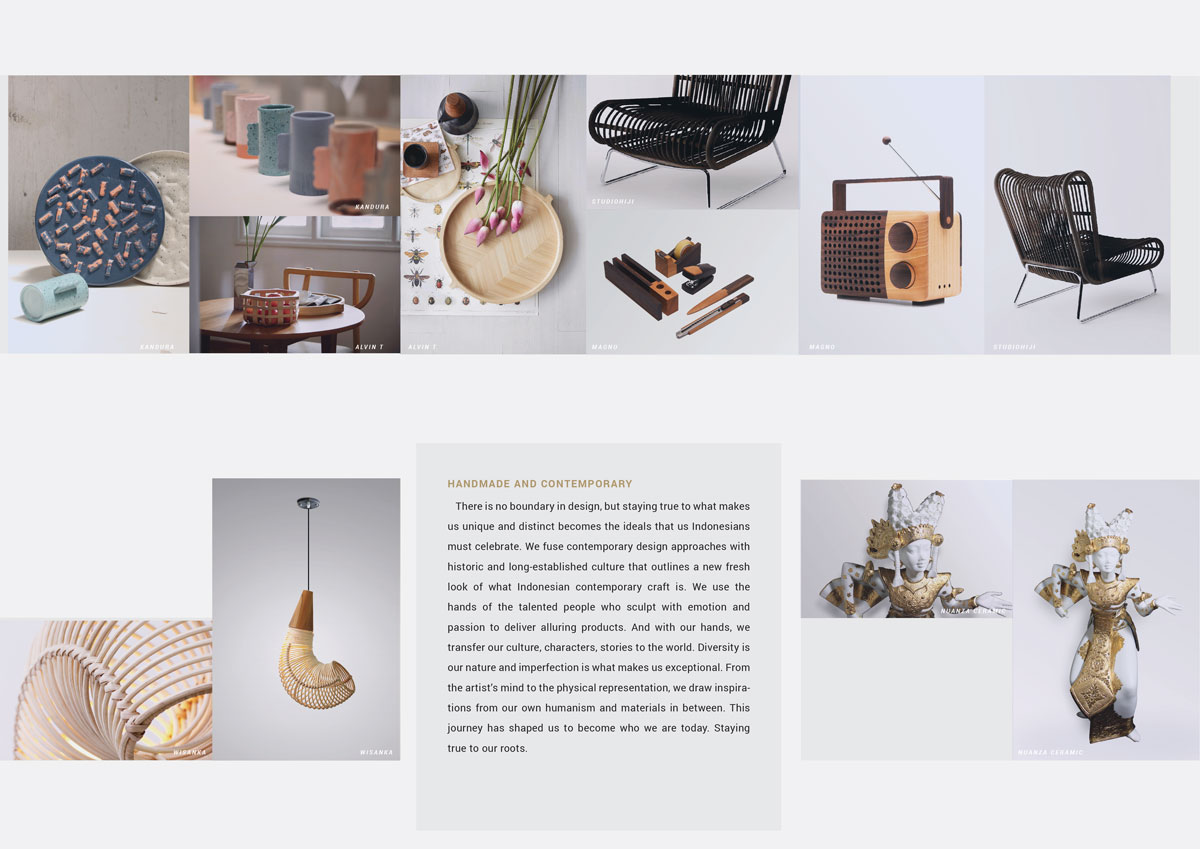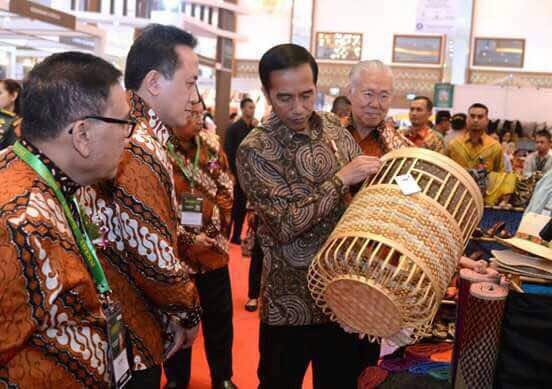The creative economy is generating many new businesses driven by the rapid development of technology and a climate conducive to entrepreneurship.
The creative economy is generating many new businesses driven by the rapid development of technology and a climate conducive to entrepreneurship.
Euis Rohani, who runs Rajasamas Jaya with the Raja Serayu and Rajasamas Batik Maos brands, spoke of the government’s strong commitment to developing local creative ventures.
The Raja Serayu brand originated out of the collaborative Designer Dispatch Service (DDS) program initiated by the Ministry of Trade in 2016, while the Creative Economy Agency (Bekraf) is responsible for expanding the brand’s exposure at Ambiente 2017, one of the largest international trade shows in Europe. Through Ambiente 2017, Bekraf aims to encourage the increased export of national fashion and craft products, as well as to support brands in entering new markets, while the DDS program facilitates collaboration in design development involving business players, designers and entrepreneurs from regions across Indonesia.
Raja Serayu explores design that combines hand-painted woven batik fabrics and bamboo, and symbolizes the regeneration of interconnected batik makers in Cilacap, Central Java.
Raja Serayu’s products passed the curation selection at Ambiente Talents 2017 and was shortlisted along with 38 designers from 18 countries. Through the event, Raja Serayu’s products won the Ambiente Talent award for using new materials in their creation. Since Raja Serayu’s participation in Ambiente 2017, orders for its handmade products flooded Euis’ workshop in Cilacap, leaving her 15 employees of mostly young housewives and 200 local artisans working hard to meet the orders.
Rajasamas Batik, which is owned by Euis and Tonik from Cilacap, also collaborates with Mufti Alem. Apart from using bamboo, Rajasamas Jaya also uses rattan, rumput ilalang (alang-alang) and enceng gondok (water hyacinths). One product in high demand is their woven bamboo laundry basket.
Euis has received an order for 16 shipping containers of the laundry baskets from Riyadh, Saudi Arabia. “Now, we are preparing the third container and it is expected to be delivered by end of August,” said the 40-year-old mother of two enthusiastically. The company employs local housewives and dozens of artisans from several Cilacap subdistricts in producing their products.

Euis expressed her appreciation for the professionalism of the Trade Ministry and Bekraf officials, who have given strong support to local handicraft business players.
A case in point, she said, was a recent handicraft exhibition in Salone del Milano, Italy, where Bekraf facilitated the Handmade Contemporary Indonesian Pavilion. She didn’t attend the exhibition in person, but a team from Bekraf gave her a list of buyers interested in her products after the exhibition.
“Bekraf plays an important role in promoting and netting global buyers of our products. They work sincerely and professionally, and they demand nothing from us. Their intention is simply to develop our creative economy,” said the alumna from Bandung’s Pasundan University.
One thing certain about Euis’s venture is its social mission. She aimed to empower housewives who preferred to work in their home country, rather than overseas as migrant workers. “I also want to help create more jobs and raise the standard of living,” she said.
Khanaan Boutique brand manager Iskandarsah also echoed a similar view on Bekraf’s professionalism. He said that in its bid to help local designers expand their market overseas, Bekraf has mapped potential target countries, and “this way, products could effectively reach the target market”.
Iskandarsah explained further that Bekraf selected candidates for its international marketing program based on the assessment of a team of curators instead of by direct appointment, which provided an unbiased outcome for candidates. “They (Bekraf) are directly accountable to the President,” he added.
Khanaan Boutique, owned by the young and talented designer Khanaan Shalman, was established in 2009. The brand passed the Bekraf selection process and joined a May 18 show at Arab Fashion Week 2017 in Dubai, the United Arab Emirates.
Khanaan explained that the theme they chose was based on the target market: “We carried the theme lumiere, or light, that takes its inspiration from the light that illuminates architecture of Jaipur, the pink city of India. For the fabric, we maintained traditional way of making batik using the canting (spouted copper hand tool) and malam (hot liquid wax), but in terms of design, we modified the batik motifs, using simple and modern cuts but with luxury details, making the products have an elegant look.”
“Our boutique received many orders after the event,” he said, adding that the brand also took part in 2015’s Hey Arabian Fashion Exhibition in Qatar, which attracted many key business players in the local fashion industry.
In helping to promote Indonesian designers overseas, Bekraf fulfills more than just a facilitating role. “They monitor our business. We send a report to them each month and they are ready to lend a hand if we face any problems.” Khanaan said. Khanaan applies a downstream-to-upstream strategy, starting with from batik making in Pekalongan, Central Java. “Hundreds of batik makers are involved in finishing the pieces in Jakarta, where we employ 30 people,” said Iskandar.
Milestone
Raja Serayu and Khanaan Boutique are a among the brands that Bekraf has served to help them further develop their reach through the agency’s top programs, which are designed by the respective deputies within the creative economy ecosystem.
The two brands’ high need for inceased global branding falls within the scope of the marketing deputy, with programs designed specifically to boost global branding for national creative economy products, including fashion, crafts and the culinary sector.
In early 2015, President Joko “Jokowi” Widodo issued Presidential Decree No. 6/2016, paving the way for establishing the Indonesian Creative Economy Agency, a non-ministerial agency dedicated to assisting the President to set, coordinate and synchronize creative economy policies. Bekraf’s establishment has been seen by many as a milestone in developing Indonesia’s creative economy.
The agency is led by chairman Triawan Munaf who, along with its vice chairman, general secretary and six deputies, strives to implement the agency’s vision to turn Indonesia into one of the world’s leading creative economies by 2030.
To achieve this vision, Bekraf is realizing its holistic mission to unite all assets and creative potentials to become an independent, creative economy nation; to create an ecosystem conducive to the development of creative economy by opening horizons and raising public appreciation for all aspects of the creative economy; to raise public awareness on intellectual property rights, including legal protection of creative rights; and to design and implement specific strategy to put Indonesia on the global map of creative economy.
When it comes to creative business growth, business players need to be highly aware of a wide range of aspects, including branding, marketing, intellectual property rights, data management, funding, partnerships, networking and regulations. But startups commonly face growth-hindering issues, depending on the individual company. Some companies, for example, may find difficulties in obtaining intellectual property rights, critical to safeguarding the added values their products offer.
This explains why, within the creative economy ecosystem framework that Bekraf is currently building, the agency has six deputies, each with its own programs to help resolve stakeholders’ problems. The six deputies are responsible for Research, Education and Development; Access to Capital; Infrastructure; Marketing; Intellectual Property, Rights and Regulations, and Institutional and Regional Relations.
The deputies are expected to translate Bekraf’s vision and missions into programs accommodating the needs of 16 select subsectors: cuisine, crafts, fashion, application and game development, architecture, interior design, visual communication design, product design, film and video animation, photography, television and radio, music, performing arts, publishing and advertising.
The Research, Education and Development deputy is responsible for programs that include Coding Mum, an educational program that teaches coding and programing to housewives; facilitating the music database and compiling folklore for PIXAR Animation Studios; and providing packaging training for the culinary sector.
Meanwhile, the Access to Capital deputy has designed its Creative Economy Fund (DEKRAF) program, which supports business players in the 16 subsectors. To realize the program, this deputy join forces with banking and non-banking institutions.
Bekraf’s Infrastructure deputy has the duty of preparing programs that support the formation of an ecosystem conducive to the national creative economy. This includes government aid to facilitate the revitalization of physical infrastructure for creative spaces, creative space equipment, information technology and communications.
Programs under the Marketing deputy include ICINC (Indonesian Creative Incorporated), which aims to provide a comprehensive branding strategy for Indonesian creative products in international markets. Programs within ICINC include Archipelageek for the apps and games development subsector.
The Institutions and Regional Relations deputy focuses on coordinating ministries, institutions and regions, signing memorandums of understanding (MoUs) with governmental institutions and non-governmental organizations on creative economy cooperation, forming a curating committee across ministries and organizations to help and supervise working programs across the 16 creative economy subsectors.
All six Bekraf deputies are fully committed to building a conducive creative economy ecosystem by carrying out their roles professionally and working cooperatively with creative players.


